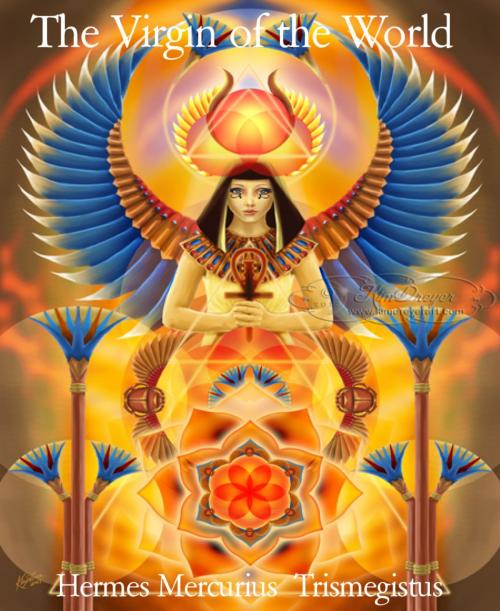| Author: | Hermes Mercurius Trismegistus | ISBN: | 9783736804012 |
| Publisher: | BookRix | Publication: | June 28, 2019 |
| Imprint: | Language: | English |
| Author: | Hermes Mercurius Trismegistus |
| ISBN: | 9783736804012 |
| Publisher: | BookRix |
| Publication: | June 28, 2019 |
| Imprint: | |
| Language: | English |
THE mystic title of this celebrated Hermetic text the "Kosmic Virgin," is in itself a revelation of the wonderful identity subsisting between the ancient wisdom-religion of the old world, and the creed of catholic Christendom. Koré is the name by which, in the Eleusinian Mysteries, Persephone the Daughter, or Maiden, was saluted; and it is also--perhaps only by coincidence the Greek word for the pupil or apple of the eye. When, however, we find Isis, the Moon-goddess and Initiatrix, in her discourse with Horos, mystically identifying the eye with the soul, and comparing the tunics of the physical organ of vision with the envelopes of the soul; when, moreover, we reflect that precisely as the eye, by means of its pupil, is the enlightener and percipient of the body, so is the soul the illuminating and seeing principle of man, we can hardly regard this analogy of names as wholly unintentional and uninstructive. For Koré, or Persephone, the Maiden, is the personified soul, whose "apostasy," or "descent," from the heavenly sphere into earthly generation, is the theme of the following Hermetic parable. The Greek mysteries dealt only with two subjects, the first being the drama of the "rape" and restoration of Persephone the second, that of the incarnation, martyrdom, and resuscitation of Dionysos-Zagreus. By Persephone was intended the Soul; and by Dionysos, the Spirit. Hermetic doctrine taught a fourfold nature both of the Kosmos and of Man; and of this fourfold nature two elements were deemed immortal and permanent, and two mortal and transient. The former were the spirit and the soul; the latter, the lower mind--or sense-body--and the physical organism. The spirit and soul, respectively male and female, remained throughout all the changes of metempsychosis the same, indissoluble and incorrupt, but the body and lower intellect were new in each rebirth, and therefore changeful and dissoluble. The spirit, or Dionysos, was regarded as of a specially divine genesis, being the Son of Zeus by the immaculate Maiden--Koré-Persephoneia, herself the daughter of Demeter, or the parent and super-mundane Intelligence, addressed in the Mysteries as the "Mother." But Koré, although thus of heavenly origin, participates more closely than her Son in an earthly and terrestrial nature. "Hence," says Proclos, "according to the theologians who delivered to us the most holy Mysteries, Persephone abides on high in those dwellings of the Mother which she prepared for her in inaccessible places, exempt from the sensible world. But she likewise dwells beneath with Pluto, administering terrestrial concerns, governing the recesses of the earth, and supplying life to the extremities of the Kosmos."
THE mystic title of this celebrated Hermetic text the "Kosmic Virgin," is in itself a revelation of the wonderful identity subsisting between the ancient wisdom-religion of the old world, and the creed of catholic Christendom. Koré is the name by which, in the Eleusinian Mysteries, Persephone the Daughter, or Maiden, was saluted; and it is also--perhaps only by coincidence the Greek word for the pupil or apple of the eye. When, however, we find Isis, the Moon-goddess and Initiatrix, in her discourse with Horos, mystically identifying the eye with the soul, and comparing the tunics of the physical organ of vision with the envelopes of the soul; when, moreover, we reflect that precisely as the eye, by means of its pupil, is the enlightener and percipient of the body, so is the soul the illuminating and seeing principle of man, we can hardly regard this analogy of names as wholly unintentional and uninstructive. For Koré, or Persephone, the Maiden, is the personified soul, whose "apostasy," or "descent," from the heavenly sphere into earthly generation, is the theme of the following Hermetic parable. The Greek mysteries dealt only with two subjects, the first being the drama of the "rape" and restoration of Persephone the second, that of the incarnation, martyrdom, and resuscitation of Dionysos-Zagreus. By Persephone was intended the Soul; and by Dionysos, the Spirit. Hermetic doctrine taught a fourfold nature both of the Kosmos and of Man; and of this fourfold nature two elements were deemed immortal and permanent, and two mortal and transient. The former were the spirit and the soul; the latter, the lower mind--or sense-body--and the physical organism. The spirit and soul, respectively male and female, remained throughout all the changes of metempsychosis the same, indissoluble and incorrupt, but the body and lower intellect were new in each rebirth, and therefore changeful and dissoluble. The spirit, or Dionysos, was regarded as of a specially divine genesis, being the Son of Zeus by the immaculate Maiden--Koré-Persephoneia, herself the daughter of Demeter, or the parent and super-mundane Intelligence, addressed in the Mysteries as the "Mother." But Koré, although thus of heavenly origin, participates more closely than her Son in an earthly and terrestrial nature. "Hence," says Proclos, "according to the theologians who delivered to us the most holy Mysteries, Persephone abides on high in those dwellings of the Mother which she prepared for her in inaccessible places, exempt from the sensible world. But she likewise dwells beneath with Pluto, administering terrestrial concerns, governing the recesses of the earth, and supplying life to the extremities of the Kosmos."















